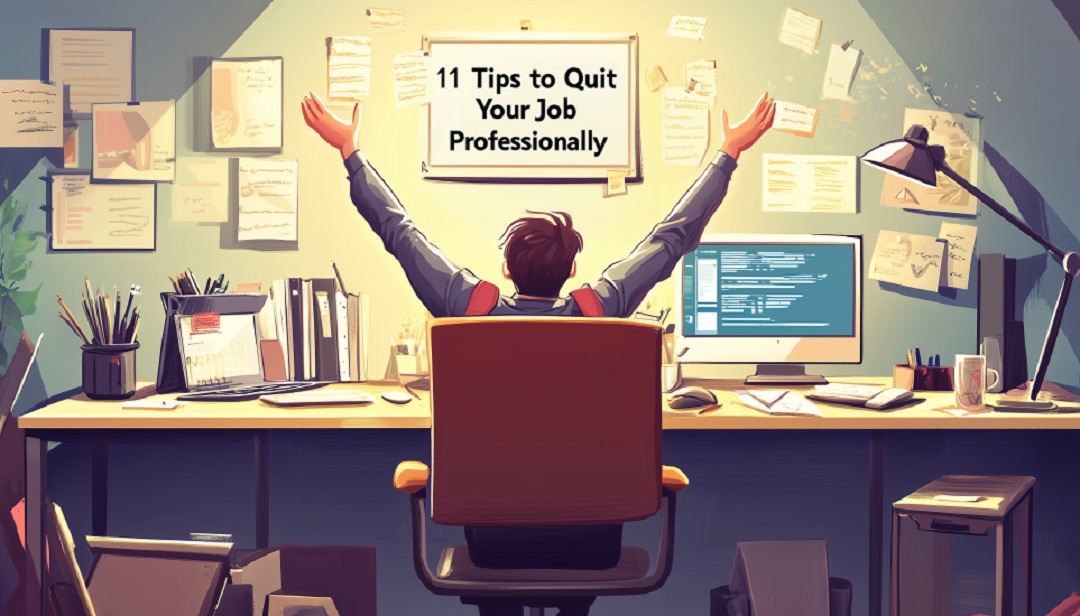How Do You Quit a Job: 11 Tips to Quit a Job in a Professional Manner
Quitting your job professionally is more than just following protocol ― it’s about maintaining relationships and protecting your professional reputation. How you leave your position is just as important as how you perform in it. Remember that a professional departure demonstrates your work ethics, potentially opening doors for future opportunities, but at the same time, maintain valuable professional connections.


Back
7 mins read
Moving on from your current job comes with a mixed bag of emotions. You'll probably feel that itch, that unmistakable pull telling you it's time to move on. Whether you’re leaving for a better opportunity or just ready for a change, make it an easy and smooth transition for yourself and your employer by quitting your job in a professional manner.
A professional approach to quitting not only makes your notice period easier but also helps keep your future references and professional reputation intact. But, hey, how do you quit a job with grace and poise? That's what this guide is for!
I will guide you through what to do before you resign and how to make your exit as professional and smooth as possible.
Before You Quit: The Do's and Don'ts

So you've been thinking about quitting your job? Before you jump the gun and hand in your resignation letter, there are a few things you should and shouldn't do. Let's take a look at some of them.
1. Do Ensure You’re Resigning for the Right Reason
Before you decide to quit, ensure you do it for the right reasons. Are you leaving because of burnout or a toxic work environment? Or are you just chasing a higher salary and better perks? It's essential to evaluate your motivations, consider your work-life balance, and ensure that quitting is the best decision for your career growth.
2. Do Talk to Your Manager About Your Decision Before Your Colleagues
The worst thing you can do is to let your manager hear about your resignation through the grapevine — this shows a lack of respect and professionalism. Regardless of your reasons for leaving, your manager should always be the first to know.
3. Do Consult Your Family and Close Friends About Your Decision
When making big changes in your life, getting a second opinion from those with your best interests is always helpful. Discussing the situation can also help you to clarify your thoughts and feelings about quitting.
4. Don't Act on Impulse
Quitting your job is a big decision that shouldn't be made in the heat of the moment. Take some time to think it through — sleep on it, if you will — and be sure that whatever you do, don't leave on a whim. Many people make the same mistake of acting impulsively, especially those with ADHD, only to regret their decision later.
5. Don't Leave Your Current Job Without Another Job Lined Up (If Possible)
There's nothing worse than quitting your job only for a job offer to fall through. So, before handing in your notice, ensure you've received a signed and approved job offer from your new employer.
11 Tips to Quit Your Job Professionally

Alright, you've considered all the do's and don'ts and have made up your mind. It's time to quit your job! Here are some tips to help you make a smooth and professional exit:
1. Present a Respectable Reason for Departing
You'll likely need to share the reason for your resignation. Your current employer may probably want to know why you're leaving, and potential future employers will likely ask.
You should always be tactful and honest about your reason(s) and avoid speaking negatively about the company or your colleagues. Doing so will help you remain on good terms with your soon-to-be former employer.
Below are some of the best and worst reasons to give for quitting your job:
| "Good" Reasons for Resigning | "Worst" Reasons for Resigning |
|---|---|
| 'I'm switching my career paths" | 'I'm quitting due to frustration" |
| 'I'm pursuing personal growth and development" | 'I'm leaving because I don't like my boss or co-workers" |
| 'I'm pursuing personal growth and development" | 'I'm leaving because I don't like my boss or co-workers" |
| "I've been given a better opportunity at another company" | “I'm bored at work” |
| "I'm relocating for family or personal reasons" | "The job is too demanding, and I can't handle the workload, or it doesn't give me job satisfaction" |
2. Submit a Formal Resignation Letter
Just imagine your boss finding out you quit via email or text message. Or, the worse, you chose to quit silently. Not a good look, right? Ensure you submit a formal resignation letter to your manager and HR department, if applicable. Your resignation letter should reiterate your decision and the important elements of your resignation.
Avoid venting frustrations or sharing negative experiences in this document. Instead, aim to leave on a positive note, acknowledging the skills you gained and the professional growth you achieved during your tenure. Expressing gratitude here helps maintain a positive reputation with your employer and future references.
We've listed the most important things to include in your resignation letter:
- The date your resignation would become effective
- A short and clear statement conveying your resignation.
- Your reason(s) for leaving (optional but recommended)
- Gratitude for the opportunities and experiences you had while working at the company
- A willingness to ensure a smooth transition during your notice period
- Your contact information in case any follow-up is needed.
- Your signature

3. Resign in Person
While it may be tempting to send an email or slip your resignation letter under your manager's door, it's always best to resign in person. Schedule a meeting with your boss, and be prepared to discuss your decision face-to-face.
This is also an excellent opportunity to express your gratitude for working at the company and offer to assist in the transition. Additionally, you can mention your willingness to have an exit interview or provide any feedback that could help improve the company in the future.
4. Give Sufficient Notice Period
Two weeks' notice is the standard, but you may need to give more depending on your role and responsibilities. Be sure to check your employment contract or company policy to see how much notice is required.
If you can stay longer than the minimum ask, your boss will appreciate the extra time to find and train your replacement.
5. Be Prepared for Situations That May Arise
Even with the most professional approach, things can still go sideways when resigning:
You may be escorted out of the building immediately after giving your notice
This is a worst-case scenario, but it's not uncommon for companies to ask employees to leave immediately, especially if you're moving to a competitor.
Be prepared because security might be asked to escort you even before you clear up your desk. If this happens, don't take it personally. Your boss might be simply following company protocol.
Be Prepared For A Counteroffer
The funniest thing happens when you tender your job resignation notice: your boss suddenly has an offer that "will blow your socks off." But is it sincere or just a tactic to make you stay? Be prepared for a counteroffer and know before going in whether you're willing to stay if they meet certain conditions.
6. Offer to Train Your Replacement
Most people think that once they resign, their job is done. However, offering to train your replacement can go a long way in ensuring a smooth transition. You have valuable knowledge and experience that will help your successor perform well in the role.
Make a list of the most important tasks and throw in some tips and tricks you've learned while on the job. This is a great way to leave on good terms and show your professionalism.
7. Stay Positive Until the Very End
Leaving a job may be an exciting opportunity, but it can also be bittersweet. It's natural for emotions to run high during this time. You may feel sad, excited, relieved – or all three at once! But remember, it's essential to maintain professionalism until the end.
Be sure to stay positive throughout the resignation process. Don't let negative emotions affect your interactions with your boss or co-workers. Remember, they could still serve as valuable references for future job opportunities.
8. Tie Up Loose Ends
Leaving your role doesn’t mean slacking off in your final weeks. And nothing is more disappointing than leaving your successor with a bunch of unfinished projects and messy files. Continue to show up each day with dedication, maintaining the same work ethic that you would if you weren’t leaving.
Prioritize completing projects and organizing files for whoever will take over. When the new person assumes your role, a seamless transition ensures that your departure is seen as smooth and professional, further establishing your reputation as a reliable and responsible employee.
9. Say Goodbye Without Burning Bridges
When you apply for a new job, you're going to need a good reference from your previous job. So, as much as we would like to tell our boss how we really feel about them or the company, it's never a good idea to burn bridges when quitting for the sake of your professional future.
You may even never know when you might encounter former colleagues or managers in a future role or industry event. Leaving on a sour note can damage your professional network and reputation, impacting potential job opportunities or references down the line. Instead, focus on expressing gratitude and leaving a positive impression
10. Inform Your Close Coworkers Personally
It’s always a shock when someone decides to leave, especially for those you work closely with daily. Instead of letting them find out through the office grapevine or an email blast, take a moment to tell them personally.
Grab a coffee, go for a quick walk, or pull them aside for a casual chat. Giving them a heads-up shows that you value the relationship, and it makes the news a bit easier to digest.
11. Follow Up With a Thank You Note
Once you’ve had all the bittersweet goodbyes, follow up with a thank you note — you know, just so they don’t forget how awesome you are. Drop a quick email or a handwritten note if you’re feeling fancy, and throw in a line or two about what you appreciated, maybe a joke about “surviving all those Monday meetings together” or “keeping the coffee supply stocked.”
It’s an excellent way to appreciate and remind everyone you’re grateful for the memories, and hey, it never hurts to leave a trail of good vibes as you head off to greener pastures!
Embrace Change While Maintaining Professionalism!

Quitting your job professionally is about more than just following procedures — it's about maintaining relationships and protecting your professional reputation. Remember that how you leave a position is just as important as how you perform in it.
A professional departure demonstrates your character and work ethic, potentially opening doors for future opportunities while maintaining valuable professional connections.
Whether you're moving on to a new job opportunity or taking time to reassess your career path, maintaining professionalism during your resignation process helps ensure a positive transition for all parties involved.
If you're unsure about your next step, consider taking a career test to gain clarity on what roles align best with your skills and interests. A little self-reflection now can set you up for long-term career satisfaction and success.
Take pride in leaving your current position with the same professionalism that marked your tenure with the company.


Return to Blog





